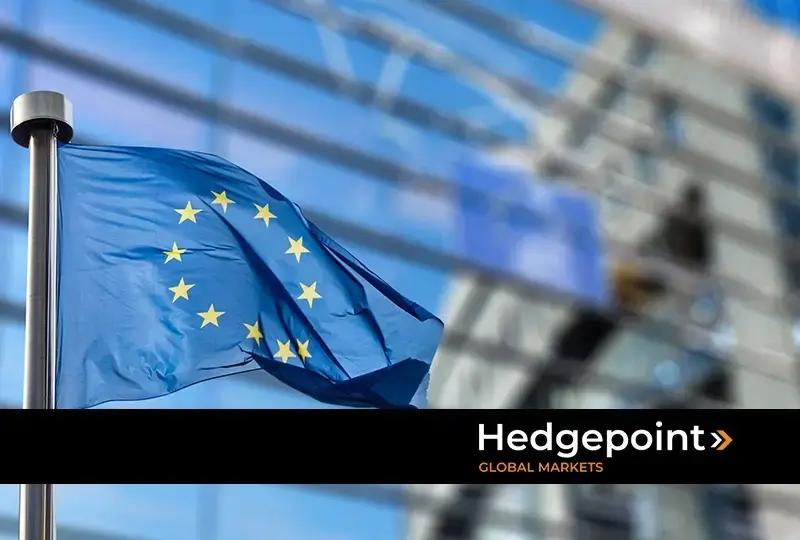
In 2023, the European Parliament approved new import rules for European Union (EU) countries. These measures are aimed at initiatives such as combating the

In 2023, the European Parliament approved new import rules for European Union (EU) countries. These measures are aimed at initiatives such as combating the loss of biodiversity and the effects of climate change.
In this sense, the new import rules affect commodity-exporting countries like Brazil. After all, these nations will have to adjust to the requirements imposed in order to be able to export their goods to the members of this bloc. The law will come into force in 2026, but the transition period has already begun.
In order for you to understand the details about this issue and the possible impacts on the commodities market, we have created this exclusive content. We invited Iago Carvalho, Head of Sales – EMEA at Hedgepoint, to explain the main points you need to know.
Enjoy reading!
The European Union maintains a strict regulatory framework with protective anti-dumping policies. Often perceived as protectionist, the EU operates as a cohesive bloc, guiding its actions with key directives focused on areas like food safety.

“The purpose of regulating the entry of agricultural products into the European Union is to ensure their safety, quality, and to protect both consumers and producers. To achieve this, phytosanitary standards are rigorously enforced to verify the origin of these products,” explains Iago Carvalho.
Throughout the history, the EU has implemented import and export quotas on various agricultural commodities. In essence, these measures are designed to protect both the final consumer and producers by mitigating asymmetric competitiveness and ensuring that products comply with environmental standards.
A recent case that exemplifies this policy is the fallout from the conflict in Ukraine. The flow of grain through the Black Sea has been compromised and has shifted to overland routes.
“The flow of products like corn and wheat has increased through neighboring countries like Poland and other Eastern European countries. This has caused a very large influx of these products and a devaluation of the producer in that specific country,” Carvalho ponders.
With Ukrainian exports compromised, an effort was made to form a humanitarian corridor in order to export these grains. In this way, the EU developed initiatives to protect producers and compensate for the loss of competitiveness.
Brazil, for example, is a country that mostly produces genetically modified soy and corn, with large-scale distribution. However, the EU has strict guidelines about the products that can enter the bloc. Therefore, it does not accept certain goods because they contain unsuitable pesticides.
In addition, there is the requirement to identify these products, with clear labeling, and the need for their origin not to be from a deforestation zone. These are some of the foundations that already existed. However, in 2023, another significant step was taken:
“Parliament has approved increased diligence in relation to deforestation and carbon emissions. Any product associated with illegal deforestation, in areas over 1 hectare, will not be accepted. This applies to areas and goods verified as of December 2020,” says Carvalho.
As a result, the European Union will tax carbon emissions that are incorporated into imported products from 2026. Not just agricultural products, but also steel, aluminum, cement and fertilizers. The EU demands these measures from domestic producers and will also demand them from foreign products:
“This is a tracking factor that goes from production to delivery to the end consumer. If companies don’t follow this line, there will be sanctions such as cash fines of up to 4% of the annual amount collected by the operator responsible,” adds Iago Carvalho.
In the transition period, importers must notify all carbon emissions from imported products through reports produced by exporters. Exporters who are unable to track and declare their emissions run the risk of losing their business partners in the EU.
According to Hedgepoint’s Head of Sales, the changes required by the EU could have an impact on trade flows. To understand the issue, consider the case of Brazil. In the medium term, smaller producers may find it difficult to adapt to some of the requirements, even though their strategies are becoming increasingly sophisticated.
Another debate revolves around the use of genetically modified products to increase the yield of the area, for example, in order to boost production:
“Brazil has opened many doors in 2023, with several new markets to export to. In the case of the EU, everyone will have to make an effort to preserve nature in the long term and have better control over carbon emissions,” says Iago Carvalho.
He points out that the European Union is very dynamic, and policies can change. In this sense, what could happen is a change in the flow of trade or the implementation of educational taxes, if countries like Brazil are slow to put some of these measures into practice:
“But what we see is a positive agenda for Brazil in terms of carbon credit trading. The country’s commodities trade is moving in a direction that ensures its relevance in the global market,” he concludes.
Global factors influence the entire dynamics of the commodities market. That’s why it’s essential to keep abreast of the main movements in the world that could have repercussions in this sector.
These include the EU’s new import rules. After all, trade flows are in danger of changing, especially if commodity-exporting countries don’t adapt.
At Hedgepoint, we have a market intelligence team that analyzes events and their risks for the commodities market. We offer hedging instruments to protect against volatility, an inherent aspect of business in this field.
You can count on our educational platform, Hedgepoint HUB, to educate you on what’s happening that could impact agricultural and energy commodities. Try 1 month of Hedgepoint HUB for free and start turning risks into opportunities.

Rua Funchal, 418, 18º andar - Vila Olímpia São Paulo, SP, Brasil
Contato
(00) 99999-8888 example@mail.com
Section
Home
O que Fazemos
Mercado
Quem Somos
HUB
Blog
Esta página foi preparada pela Hedgepoint Schweiz AG e suas afiliadas (“Hedgepoint”) exclusivamente para fins informativos e instrutivos, sem o objetivo de estabelecer obrigações ou compromissos com terceiros, nem de promover uma oferta ou solicitação de oferta de venda ou compra de quaisquer valores mobiliários, commodity interests ou produtos de investimento.
A Hedgepoint e suas associadas renunciam expressamente a qualquer uso das informações contidas neste documento que direta ou indiretamente resulte em danos ou prejuízos de qualquer natureza. As informações são obtidas de fontes que acreditamos serem confiáveis, mas não garantimos a atualidade ou precisão dessas informações.
O trading de commodity interests, como futuros, opções e swaps, envolve um risco substancial de perda e pode não ser adequado para todos os investidores. Você deve considerar cuidadosamente se esse tipo de negociação é adequado para você, levando em conta sua situação financeira. O desempenho passado não é necessariamente indicativo de resultados futuros. Os clientes devem confiar em seu próprio julgamento independente e/ou consultores antes de realizar qualquer transação.
A Hedgepoint não fornece consultoria jurídica, tributária ou contábil, sendo de sua responsabilidade buscar essas orientações separadamente.
A Hedgepoint Schweiz AG está organizada, constituída e existente sob as leis da Suíça, é afiliada à ARIF, a Associação Romande des Intermédiaires Financiers, que é uma Organização de Autorregulação autorizada pela FINMA. A Hedgepoint Commodities LLC está organizada, constituída e existente sob as leis dos Estados Unidos, sendo autorizada e regulada pela Commodity Futures Trading Commission (CFTC) e é membro da National Futures Association (NFA), atuando como Introducing Broker e Commodity Trading Advisor. A Hedgepoint Global Markets Limited é regulada pela Dubai Financial Services Authority. O conteúdo é direcionado a Clientes Profissionais e não a Clientes de Varejo. A Hedgepoint Global Markets PTE. Ltd está organizada, constituída e existente sob as leis de Singapura, isenta de obter uma licença de serviços financeiros conforme o Segundo Anexo do Securities and Futures (Licensing and Conduct of Business) Act, pela Monetary Authority of Singapore (MAS). A Hedgepoint Global Markets DTVM Ltda. é autorizada e regulada no Brasil pelo Banco Central do Brasil (BCB) e pela Comissão de Valores Mobiliários (CVM). A Hedgepoint Serviços Ltda. está organizada, constituída e existente sob as leis do Brasil. A Hedgepoint Global Markets S.A. está organizada, constituída e existente sob as leis do Uruguai.
Em caso de dúvidas não resolvidas no primeiro contato com o atendimento ao cliente (client.services@hedgepointglobal.com), entre em contato com o canal de ouvidoria interna (ombudsman@hedgepointglobal.com – global ou ouvidoria@hedgepointglobal.com – apenas Brasil) ou ligue para 0800-8788408 (apenas Brasil).
Integridade, ética e transparência são valores que guiam nossa cultura. Para fortalecer ainda mais nossas práticas, a Hedgepoint possui um canal de denúncias para colaboradores e terceiros via e-mail ethicline@hedgepointglobal.com ou pelo formulário Ethic Line – Hedgepoint Global Markets.
Nota de segurança: Todos os contatos com clientes e parceiros são realizados exclusivamente por meio do nosso domínio @hedgepointglobal.com. Não aceite informações, boletos, extratos ou solicitações de outros domínios e preste atenção especial a variações em letras ou grafias, pois podem indicar uma situação fraudulenta.
“Hedgepoint” e o logotipo “Hedgepoint” são marcas de uso exclusivo da Hedgepoint e/ou de suas afiliadas. O uso ou reprodução é proibido, a menos que expressamente autorizado pela HedgePoint.
Além disso, o uso de outras marcas neste documento foi autorizado apenas para fins de identificação. Isso, portanto, não implica quaisquer direitos da HedgePoint sobre essas marcas ou implica endosso, associação ou aprovação pelos proprietários dessas marcas com a Hedgepoint ou suas afiliadas.
aA Hedgepoint Global Markets é correspondente cambial do Ebury Banco de Câmbio, de acordo com a resolução CMN Nº 4.935, DE 29 DE JULHO DE 2021, Artigo 14 do Banco Central do Brasil (BACEN).
Para mais informações sobre nosso parceiro, serviços disponíveis, atendimento e ouvidoria, acesse o link a seguir: https://br.ebury.com/